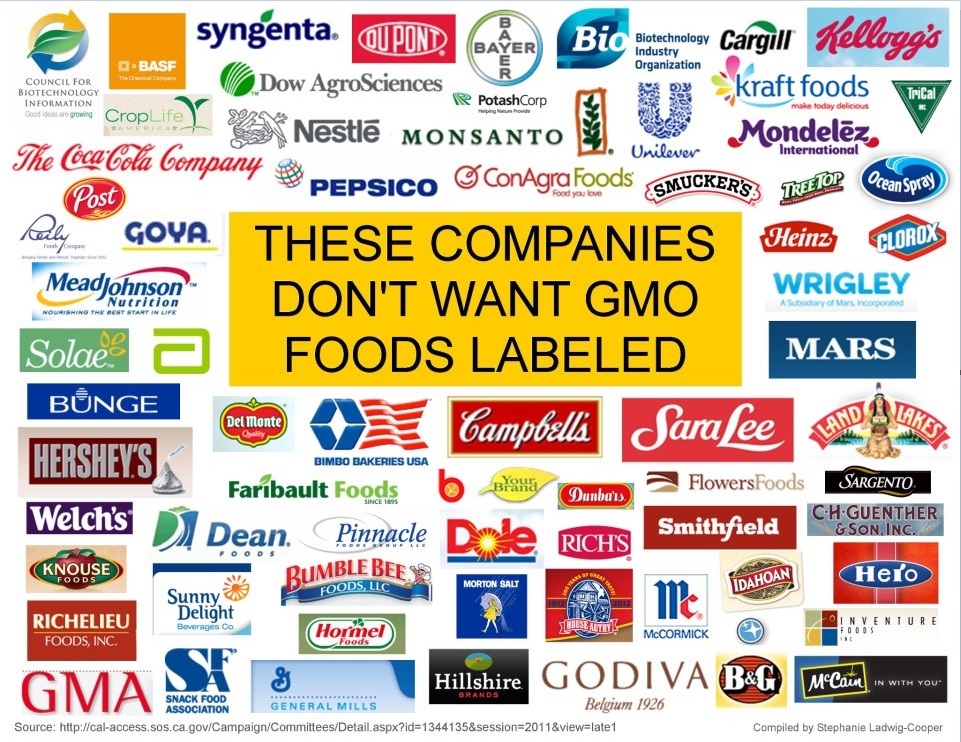
The giants of the U.S. food industry who have spent millions fighting state-by-state efforts to mandate new labels for genetically modified organisms are taking a page from their opponents and pushing for a federal GMO law.
But the Grocery Manufacturers Association, which represents such food and beverage leaders as ConAgra, PepsiCo and Kraft, isn’t exactly joining the anti-GMO movement. It’s advocating for an industry-friendly law with a voluntary federal standard — a move that food activists see as a power grab by an industry that has tried to kill GMO labeling initiatives every step of the way.
The most powerful players in the food industry say they are simply trying to find a national solution for GMO labeling, rather than having to navigate a patchwork of dozens of state laws for every packaged food item on the grocery shelf. According to a discussion draft of GMA’s proposed bill obtained by POLITICO, labeling standards would not be mandatory and the industry would submit to more FDA oversight.
The draft provides the first concrete look of what the food industry is asking for from Congress.
The push for a softer national standard on GMO labeling comes as consumer interest in biotech foods has blown up into an intense national conversation, and the food industry is clearly trying to get out ahead of a strong, vocal movement pushing strict labeling requirements in multiple states around the country.
“We believe that it’s important for Congress to engage and provide FDA with the ability to have a national standard” on GMO food labeling, Louis Finkel, head of government affairs for GMA, said. “A 50-state patchwork of regulations is irresponsible.”
GMA’s proposal is aimed at protecting its members from having to fight a series of state labeling efforts as several states, including Colorado and Oregon, look to move forward with initiatives in 2014. The push for state-level action has prompted food, beverage and biotech companies to shell out big bucks to quash such efforts, which has also earned them some unfavorable press coverage.
Two states — Connecticut and Maine — passed GMO-labeling mandates last year, but both have strict trigger clauses, requiring four other states with a combined population of more than 20 million to implement similar measures before they take effect.
Ballot initiatives in California in 2012 and Washington in 2013 were defeated, though by voting margins scarcely above 2 percentage points and only after the food and biotechnology industries spent almost $70 million in campaign ads.
“We’ve fought a mandatory label at the state level because we believe that a mandatory label misinforms consumers” by implying that there is something wrong with the product, explained Finkel, GMA’s top lobbyist.
Finkel said his group has been talking to federal lawmakers since at least last fall. He called the document obtained by Politico “an early-stage draft of trying to put pen to paper.” While there are other, more recent versions of the document, which the trade association declined to provide, Finkel said, “the talking points are exactly the same and are spot on.”
GMO-labeling advocates, like Scott Faber, the Environmental Working Group’s vice president of government affairs, however, see GMA’s effort as a “legislative hail Mary.”
“Every lobbyist in this town can name the dozen senators who would read the Bible backwards before this would become law and that’s what’s so striking,” said Faber, a former GMA lobbyist. “A far better course would be for industry to come to the table” and work with consumers to gain the disclosure of more information on their products.
But GMA isn’t the only food industry association promoting the measure. The coalition behind the effort also includes the Snack Food Association, the American Frozen Food Institute and the American Bakers Association, as well as a number of other groups.
A bill stemming from GMA’s priorities would be vastly different from other GMO-labeling efforts already in Congress. In April, Rep. Peter DeFazio (D-Ore.) and Sen. Barbara Boxer (D-Calif.) introduced bills that seek the mandatory labeling of GMO foods nationwide. The bills have garnered 48 and 14 co-sponsors, respectively, but have yet to gain much further traction.
DeFazio, a longtime champion of GMO labeling, said Monday that he has considerable concerns with the discussion draft GMA has put forward and warned that the food industry could further hurt its consumer image and bottom line if it moves ahead with the measure.
“This may be actually a misstep by the GMA — to try and proactively prohibit meaningful labeling that may in fact really kindle a much more proactive grass-roots movement on the other side,” DeFazio warned. “If they are going to kindle a national debate, given the polling on this issue, they better be thinking billions [of dollars] instead of tens of millions” needed to fight it.
“If they start to move a bill that does the opposite [of labeling that has been called for by consumers], they may not like the results,” he said.
Just last week General Mills announced it would make its original and time-honored Cheerios cereal GMO-free — a surprise move the company said was spurred by consumer demand.
Other documents, made public in a court battle with a pro-labeling group in Washington, previously revealed that GMA was planning on lobbying for a federal law to pre-empt any future state initiatives. But the document obtained most recently by POLITICO, after being circulated to various other food-related trade associations in October, details that plan.
GMA is looking for a federal solution to GMO labeling that would require the FDA to set up a voluntary labeling standard for foods that do not contain GMOs and determine the safety of GMO products. A section-by-section summary of the food industry’s legislation reveals it would preclude states from adopting any laws that are not identical to the federal requirements and create a legal framework so that FDA can take a more active role in regulating GMO-labeling claims.
Biotech food producers would have to notify the FDA about all new bioengineered foods four months before they could be marketed. Currently, notification is voluntary, but most products go through the process.
“We believe that we need to provide consumers with the confidence that FDA is looking at these ingredients” to ensure they are safe, Finkel said. “Having them look at every GMO trait that’s brought through the process for use in food is important. We believe giving consumers clarity is important.”
The draft further includes provisions that would allow a GMO-free claim to be made on dairy products from cows that consumed GMO feed and drugs developed by biotechnology, as well as foods that have been developed with a genetically engineered enzyme or processing aid, such as cheese and alcohol.
The plan also would require FDA to define the term “natural” — a word that is widely used with little meaning and has been the subject of a tidal wave of litigation against the food industry.
The question now is whether GMA can find a sponsor.
One lawmaker who has been courted by the food industry to introduce its GMO-labeling bill is House Energy and Commerce Committee Chairman Fred Upton (R-Mich.). A committee spokeswoman told POLITICO several months ago that staffers were hearing from stakeholders on the issue, and planned to get more input before moving forward. The committee would have jurisdiction over GMO-labeling legislation, the spokeswoman said.
The activist group Food Democracy Now got wind of the prospect of an industry bill in September, and issued an action alert to its 650,000-person email list. Dave Murphy, the group’s director, claimed that effort funneled more than 20,000 phone calls to Upton’s office “expressing outrage.”
While it’s not clear who the sponsor would be, there has been some indication that a bill could be proposed in Upton’s committee in the coming months, potentially as early as February or March.
GMA’s outline of its bill is ambiguous about what would be required under the safety review, say Faber, DeFazio and others. It fails to include the environmental and other potential effects of GMO foods and does not apply to genetically modified animals, like the highly controversial AquAdvantage salmon that is waiting for approval by FDA, they say.
Those are potentially significant problems.
“The most important thing FDA could do would be to have a mandatory approval process to help eliminate the concerns [over the safety of GMOs] — so that consumers can rely on FDA’s determination that they’re safe instead of having to rely on DuPont or Monsanto,” said Gregory Jaffe, director of biotech at the Center for Science in the Public Interest, a consumer group that is supportive of biotechnology but advocates for better regulatory oversight.
But Jaffe, who also reviewed the discussion draft, said it does not sound like the plan would be that much of a departure from current policy because it asks FDA to, within 90 days, say whether it objects to a GMO developer’s own safety determination. In other words, the industry does not appear to be asking FDA to actually make a safety determination on new GMO food products.
“Instead of saying, ‘We don’t object,’ I think the public deserves FDA saying, ‘We’ve reviewed the data and we think it’s safe,’” said Jaffe, who believes that such a safety determination from FDA would help allay some of the consumer concerns about the technology.
“It is good to see that people are acknowledging that there is a need for regulatory improvement and that FDA needs to be more involved,” Jaffe added.
3 WAYS TO SHOW YOUR SUPPORT
- Log in to post comments














